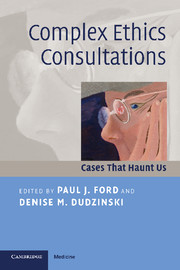Book contents
- Frontmatter
- Contents
- List of contributors
- Foreword
- Acknowledgments
- Introduction: Live and learn: courage, honesty, and vulnerability
- Part I Starting at the beginning: prenatal and neonatal issues
- Part II The most vulnerable of us: pediatrics
- Part III Diversity of desires and limits of liberty: psychiatric and psychological issues
- Part IV Withholding therapy with a twist
- Part V The unspeakable/unassailable: religious and cultural beliefs
- 17 Adolescent pregnancy, confidentiality, and culture
- 18 “Tanya, the one with Jonathan's kidney”: a living unrelated donor case of church associates
- 19 Futility, Islam, and death
- 20 Suffering as God's will
- Part VI Human guinea pigs and miracles: clinical innovations and unorthodox treatment
- Part VII The big picture: organizational issues
- Conclusions, educational activities, and references
- Index
17 - Adolescent pregnancy, confidentiality, and culture
Published online by Cambridge University Press: 03 May 2010
- Frontmatter
- Contents
- List of contributors
- Foreword
- Acknowledgments
- Introduction: Live and learn: courage, honesty, and vulnerability
- Part I Starting at the beginning: prenatal and neonatal issues
- Part II The most vulnerable of us: pediatrics
- Part III Diversity of desires and limits of liberty: psychiatric and psychological issues
- Part IV Withholding therapy with a twist
- Part V The unspeakable/unassailable: religious and cultural beliefs
- 17 Adolescent pregnancy, confidentiality, and culture
- 18 “Tanya, the one with Jonathan's kidney”: a living unrelated donor case of church associates
- 19 Futility, Islam, and death
- 20 Suffering as God's will
- Part VI Human guinea pigs and miracles: clinical innovations and unorthodox treatment
- Part VII The big picture: organizational issues
- Conclusions, educational activities, and references
- Index
Summary
Case narrative
Bena is a 14-year-old girl who is a member of a small, extremely close-knit immigrant community. She came to the emergency department with severe abdominal pain on a Tuesday night. She has been raised in the United States, speaks English as a primary language in school, and seems completely acculturated, but her mother and extended family immigrated shortly before she was born. Her mother does not speak English, and an interpreter is required for any discussions with staff. Bena lives with her mother and four siblings, but her mother was not available because she was working.
Bena said her pain had been going on for two days, and she initially denied sexual activity. When her urine pregnancy test came back positive, she admitted she had been sexually active with a cousin about her age. Further evaluation revealed an ectopic pregnancy. She was admitted to the hospital for further evaluation and treatment including consultation with an ob-gyn. Because this was a pregnancy-related issue, she could by state law consent to treatment on her own. Child Protective Services was consulted but did not open a case since this was apparently consensual relations with a same-age peer. Bena called home and left a message for her mother that she was in the hospital and that her mother should call as soon as possible.
Bena talked with the social worker and physician in the emergency department and requested that they not tell her mother that she was pregnant or sexually active. She stated that her mother would not be able to keep this information from Bena's aunt and that the entire community would soon know that she is pregnant.
- Type
- Chapter
- Information
- Complex Ethics ConsultationsCases that Haunt Us, pp. 135 - 140Publisher: Cambridge University PressPrint publication year: 2008



